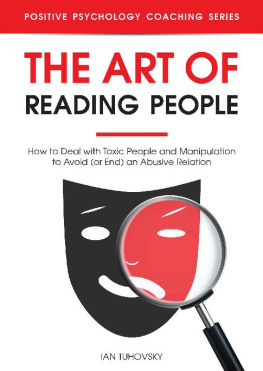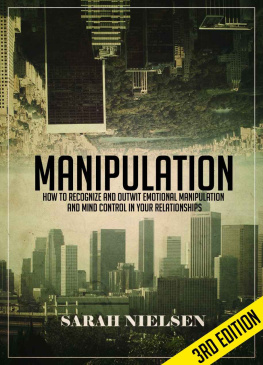All rights reserved.
No part of this book may be reproduced in any form without permission of the author.
Manipulation and body language
Since the 1980s there has been an interesting assumption in psychology. It assumes that every human being is a manipulator. Not only in certain moments but always! Even a baby can master this ability. Because through its crying it manipulates its parents because it cries out to be fed. Parents in turn manipulate their children with punishments and rewards.
This is called an educational measure to direct the children in a certain direction. Even in a love relationship there is strong manipulation. People use affection or the withdrawal of love for this purpose. The resulting emotions are an alternating bath that has a manipulative effect. It should give the love relationship the right spice so that the interest is not lost.
Everywhere in life people are manipulated to hell: in their free time, at work, while shopping, with friends and family. If this hypothesis is true, people do nothing without a specific motive to improve their chances.
Even if the manipulation is not always carried out consciously, there is the calculation behind it. There is a whole range of manipulation techniques that people master down to the smallest detail. Whoever encounters a manipulative person who is only out to make himself appear in the best light can suffer great harm.
Since these people are very kind and radiate a lot of charm, the real intentions are not even seen. Their behavior only serves to steer you in a certain direction. Perhaps you will experience this strange feeling that makes you think. You begin to think that something is wrong. You quickly put this way of thinking aside because you do not want to assume the worst. You should have listened to your gut feeling once more.
When you finally realize that you have fallen into the manipulation trap, it is already too late.
Real manipulators masterfully manage to hide their true intentions very well. The doubts they have about their character will quickly turn into a guilty conscience or worse into self-doubt, which will automatically come to you.
Sometimes they master manipulation so masterfully that they even believe their deceptions. You will encounter manipulation on a grand scale in advertising.
It's not only the pretty brochures that you regularly have in your mailbox but also the commercial breaks on TV that interrupt the film at regular intervals, whenever it gets particularly exciting. Even if you use this break to go to the fridge, keywords from the commercials will remain in your memory. These are stored quite unconsciously when your interest is aroused. You probably know the situation: Out of the blue you are interested in something you have never thought about before.
You sit down at your computer and do some research, maybe even get offers on a specific item and believe that this item will enrich your life. Oops! Then the advertising industry has managed to manipulate you. Manipulation has many faces. Manipulation also works with body language. But there are ways and means to recognize manipulation and to protect yourself from it.
What does manipulation mean?
The term manipulation is a combination of the Latin words "manus" (hand) and "plere" (fill) and can be translated as handling. Since manipulation is a hidden form of influence, it is very often used in psychology, sociology and on the political parquet. It serves to skillfully disguise true motives and to get you to do things you don't want to do. You do not see through the actual motives of the manipulators. There are many motives for why people are manipulated. In the foreground is the self-interest or the advantages that bring the manipulator closer to his goal.
The expression of manipulative behavior may vary and does not necessarily mean that there is a personality disorder. However, if the manipulation is equivalent to narcissism, it is an antisocial personality disorder. If selfish, fraudulent behavior results, this is called psychopathy, a severe personality disorder.
Manipulation is not always synonymous with targeted exploitation. Just think of our politicians who make big speeches in the Bundestag.
They rant about the other parties, accuse you of misconduct and use words to conjure up an impressive illusion that is intended to make you believe that your party makes everything better. This manipulation serves as "propaganda". Propaganda means nothing more than manipulating opinions to change them and steer them in a different direction. Politicians spread ideological ideas in their speeches to manipulate the population with views, opinions and the raised finger. A sad example of successful manipulation can be found in German history. It refers to the Third Reich. An entire people were manipulated with body language, the voice and the correctly chosen words. Today it is no different. Whoever watches the different news programs or reads different daily newspapers gets the same information, packaged differently, delivered.
Behind this lies opinion-making and manipulation, because the information transmitted is given a different weighting. The result is a different picture in each case and clearly shows in which direction the information is aimed. To recognize this, the information must of course be questioned and checked for its truthfulness.
The human being strives for life without emotional influence, where he decides autonomously and freely. Reason and passion should be the basis for his decisions and not the result of manipulation. It is therefore important that you recognize when you are being manipulated. Once you have gained this insight, you can ward off manipulation, counteract it or even use it for your purpose.
Where do people encounter manipulation?
Manipulation is omnipresent. A suggestion is used as an effective lever to influence you in your actions, thinking and behavior. No human being is immune to manipulation and can be directed in a certain direction. However, if you deal with the subject, gain a lot of knowledge and know which techniques are used, you can recognize, question and even resist manipulation. If influence is the reason for manipulation, it is about changing and reshaping decisions, opinions, attitudes, thoughts and actions. To do this, various types of influence are used to change the will, attitude, viewpoint and even personality. There is a wide field for manipulation with different effects.
- Autosuggestion or self-influencing
- Values
- Religious attitudes and beliefs
- Education
- Family and partnership
- Workplace, supervisor, and boss
- external appearance (clothing, language, voice, appearance, body language...)
- World Wide Web and social media channels
- Advertising (newspapers, magazines, leaflets...)
- Media (television, radio...)
- Public meetings
The manipulation is done by flattery, demonstrative superiority, provocation and the creation of emotions because this is how attention is drawn. Cursing, threatening, highlighting special amenities, arousing positive feelings and desires. In combination with a request for action the manipulation succeeds perfectly.
Other influencing mechanisms include
- The choice of language
- A pictorial way of expressing yourself and the
- Body language.
Take a closer look at advertising on television under these aspects. What do you see? The short advertising sequences always appeal to a certain age group.









